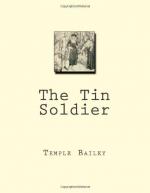When he had gone, importantly, Emily saw the Doctor’s eyes upon her. “I hated to sell it,” she said, with a sigh; “goodness knows when I shall get another. But I can’t resist the children—”
He laughed. “You are a miser, Emily.”
He had known her for many years. She was his wife’s distant cousin, and had been her dearest friend. She had taught in a private school before she opened her shop, and Jean had been one of her pupils. Since Mrs. McKenzie’s death it had been Emily who had mothered Jean.
The Doctor had always liked her, but without enthusiasm. His admiration of women depended largely on their looks. His wife had meant more to him than that, but it had been her beauty which had first held him.
Emily Bridges had been a slender and diffident girl. She had kept her slenderness, but she had lost her diffidence, and she had gained an air of distinction. She dressed well, her really pretty feet were always carefully shod and her hair carefully waved. Yet she was one of the women who occupy the background rather than the foreground of men’s lives—the kind of woman for whom a man must be a Columbus, discovering new worlds for himself.
“Yon are a miser,” the Doctor repeated.
“Wouldn’t you be, under the same circumstances? If it were, for example, surgical instruments—anaesthetics—? And you knew that when they were gone you wouldn’t get any more?”
He did not like logic in a woman. He wanted to laugh and tease. “Jean told me about the white elephant.”
“Well, what of it? I have him at home—safe. In a big box—with moth-balls—” Her lips twitched. “Oh, it must seem funny to anyone who doesn’t feel as I do.”
The door of the rear room opened, and Jean came in, carrying in her arms an assortment of strange creatures which she set in a row on the floor in front of her father.
“There?” she asked, “what do you think of them?”
They were silhouettes of birds and beasts, made of wood, painted and varnished. But such ducks had never quacked, such geese had never waddled, such dogs had never barked—fantastic as a nightmare—too long—too broad—exaggerated out of all reality, they might have marched with Alice from Wonderland or from behind the Looking Glass.
“I made them, Daddy.”
“You—.”
“Yes, do you like them?”
“Aren’t they a bit—uncanny?”
“We’ve sold dozens; the children adore them.”
“And you haven’t told me you were doing it. Why?”
“I wanted you to see them first—a surprise. We call them the Lovely Dreams, and we made the ducks green and the pussy cats pink because that’s the way the children see them in their own little minds—”
She was radiant. “And I am making money, Daddy. Emily had such a hard time getting toys after the war began, so we thought we’d try. And we worked out these. I get a percentage on all sales.”




